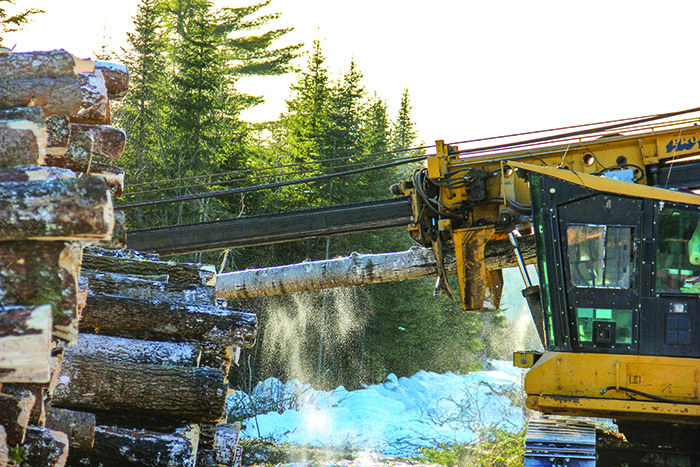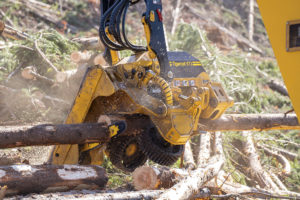Maine Loggers Gain Right To Bargain But Will They Stick Together And Do It?
Article by David Abbott, Associate Editor, Timber Harvesting September/October 2019
Maine loggers and wood haulers now have the right to engage in collective bargaining after Governor Janet Mills signed into law on June 7 LD 1459, “An Act To Expand Application of the Maine Agricultural Marketing and Bargaining Act of 1973 to Harvesters and Haulers of Forest Products.” Maine Senate President Troy Jackson,D-Allagash, who is also a fifth-generation logger, sponsored the bill.

Contractors are generally not granted collective bargaining rights. However, states can exempt certain industries from federal anti-trust laws, and Maine had already made anti-trust exemptions for other key agricultural industries in the state—potato farmers, fishermen and lobstermen—to form cooperatives and collectively bargain for improved conditions. This new bill extends the same exemptions to timber harvesters and log haulers by expanding the definition of “independent agricultural contractor” to include those who harvest or haul forest products under contract.
The bill states, in part, that “The harvesting and hauling of forest products are performed by numerous loggers and forest products haulers who individually are not able to bargain effectively with forest landowners. The marketing and bargaining position of individual loggers and forest products haulers is adversely affected unless they are free to join together voluntarily in cooperative organizations. The inequity of power in determining compensation and the lack of opportunity to join together in bargaining over compensation can result in unfair contract rates for the services of loggers and forest products haulers. Current law authorizes the membership of farmers in cooperative organizations and requires handlers of agricultural products to bargain in good faith with such organizations. This bill recognizes that market forces that affect the marketing and bargaining position of individual farmers similarly affect the marketing and bargaining position of individual harvesters and haulers of forest products, and it expands application of the Maine Agricultural Marketing and Bargaining Act of 1973 to include harvesters and haulers of forest products.”
With this Act’s passage, Maine joins six other states–California, Oregon, Washington, Idaho, Pennsylvania and West Virginia–that already have similar exemptions for forest products businesses.
Passage
As the bill was debated in the state legislature and loggers and truckers were asked to testify, Jackson says, “The landowners were sitting right there in the front row. It was an intimidation tactic.” Retaliation from landowners was an obvious concern for many, and while many still came forward, many others didn’t. Jackson doesn’t blame them. “I can’t in good conscience put people at risk.” Instead, many who were already retired spoke on their behalf.
Most of the voting followed party lines and Republicans don’t believe in collective bargaining, Jackson notes. The bill passed 21-14 in the Democrat-controlled Senate but was much tighter in the House, which is closely split between parties. In the end, Jackson convinced two Republicans to cross the aisle and vote his way.
“It was a significant win but I remember the losses we have been through so many times.” What he thinks is different this time: this time they have the International Assn. of Machinists and Aerospace Workers (IAMAW) union, with its 700,000 members, political connections and resources standing with them. With IAMAW support, around 200 Maine loggers have formed the New England Loggers Cooperative and selected Jackson as the new organization’s first president. (The example was set by the Maine Lobster Union, formed in 2013 as IAMAW Local 207.)
Jackson says it could work a lot of different ways. “The number one thing in the legislation is that there is no violation of anti-trust laws if two loggers talk about prices.” Loggers are now allowed to negotiate; it will be up to them to do so. The goal is for loggers to be able to negotiate better pay, better hours and the ability to offer health insurance via a co-op.
“If the loggers can stick together and form the cooperative the bill refers to, then this could be a game changer for the current procurement system that has stymied loggers for decades,” according to Danny Dructor, the Executive Director of the American Loggers Council. “They would do well to take a look at the practices and outcomes from the farmers who are members of cooperatives who have been operating successfully under this structure.”
Latest News
Idaho Health Group Plan Keeps Growing
Idaho Health Group Plan Keeps GrowingA note in the March-April Idaho Logger publication of the Associated Logging Contractors-Idaho loggers association says the group’s health plan that...
New From Tigercat: Triangulated Harvesting Head
In late September 2023, visitors to the Pacific Logging Congress, a live demo event held in Washington state, got a sneak peak of the new Tigercat 573 harvesting head processing logs on the end of a Tigercat 875E logger. Since then, multiple units have been testing in far flung regions from Alberta to Australia and the results are in. The 573 is shaping up to be a high performing, reliable head for roadside processing and harvesting.
AOL Health Insurance Now Available In Oregon
Following approval from Oregon’s Division of Financial Regulation at the end of 2023, Associated Oregon Loggers is now offering logger health plans through the association. The new AOL Association Insurance Program, offered by a partnership between the AOL Health Benefits Trust and the insurance provider, Health Net of Oregon.
WANT MORE CONTENT?
Spanning seven decades since its inception in 1952, Timber Harvesting highlights innovative and successful logging operations across the U.S. and around the world. Timber Harvesting also emphasizes new technology and provides the best marketing vehicle for the industry’s suppliers to reach the largest number of loggers in North America and beyond.
Call Us: 800.669.5613

